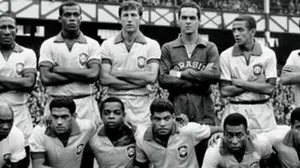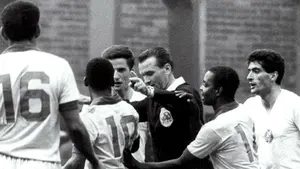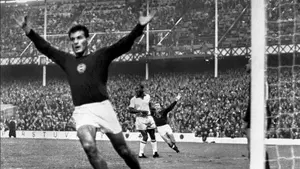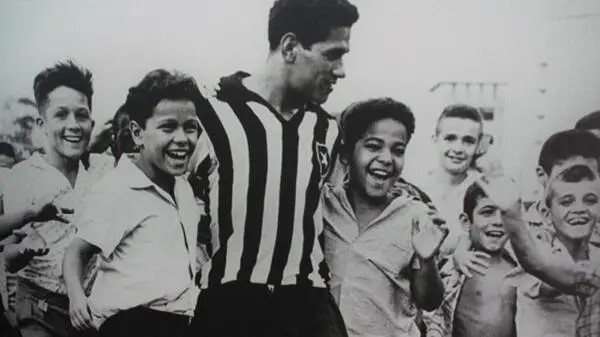Mane Garrincha reached the peak of his powers at World Cup 1962, his performances in Chile so inspirational that even the loss of Pele to injury couldn’t derail Brazil’s charge to a second consecutive title.
He spent a lifetime spreading joy with his magical feet that overcome physical deformity to enchant an entire generation, from Belo Horizonte to Beijing, but as his career wound down at Botafogo, the moments of genius became increasingly sporadic. Garrincha’s star was falling so rapidly that opponents had begun to mock him. He was already falling apart. Knee surgery had done little to repair the real damage, as the true extent of his debilitating alcoholism became more and more visible.
For all his achievements on the world stage, and his local heroics in the Rio state championship, come 1966 the legendary no.7 was no longer the same. However, the Brazilian Football Federation (CBD) – now CBF – never lost faith – after all, Brazil had never lost a match with Mane Garrincha in the line-up. They were sure that reuniting Pele and Garrincha would lead to an unprecedented hat-trick of consecutive World Cup titles.
But by 1965 Garrincha was only really playing for his club in friendlies and exhibitions, as a young forward by the name of Jairzinho emerged in Rio. That led to Garrincha’s relationship with Botafogo formally came to an end, amidst suggestions that one of the greatest footballer’s the world has ever seen was never properly compensated by his club. He was sold to Corinthians.

The Sao Paulo-based club was 12 years without a title and desperately needed a superstar to ease the tensions in the stands. While unable to control his drinking, Garrincha did manage to lost eight kilos by the time he made his Corinthians debut in front of 45,000 packed into the Pacaembu. But they were greeted only by the ghost of the player who had conquered the world. Corinthians were roundly beaten 3-0 by Vasco da Gama.
He would help his new club end their wait for glory, but more due to the disorganisation of the Brazilian game rather than for any on-pitch heroics. With no time to complete the season ahead of the World Cup, Corinthians were named alongside three other clubs as the champions of a Rio-Sao Paulo competiton.

Prior to the big kick-off in England, local journalist Peter Lorenzo of The Sun warned, “Full-backs of the world, unite. Garrincha has returned!” But the fact was hadn't. Not really. The myth was briefly perpetuated a moment longer after as he and Pele netted a goal each to dispatch Bulgaria 2-0 at Goodison Park in Brazil’s opener, but ‘66 would bring only disappointment.
In Brazil’s second match they went down 3-1 to Hungary in what would be the only defeat Garrincha would ever suffer in the famous yellow shirt. He was left out of Brazil’s final group game, a defeat by the same scoreline to Portugal.
He had arrived in England with his stock still high following his remarkable World Cup performances in previous years, but local supporters had seen the decline. And now so had everyone else.
Memory is a curious thing. At the time, many criticised the decision to keep faith with Garrincha, while others, devoutly faithful to the star as if he possessed superpowers, believed he would still make a difference. But he could not. His glittering international career was over.

He left Corinthians soon after, enduring brief spells with Portuguesa Carioca, Atletico Junior in Colombia, Rio giants Flamengo and, finally, with modest Olaria before hanging up his boots for good in 1972. It was then the the longing truly began, because that was the moment it was over. It was from that exact point that great yearning began. How we wish we could still see those spectacular dribbles of a footballer who really just wanted to have some fun.
At his height nobody could stop Garrincha – no full-back could dispossess that crooked bird who was perhaps the most talented player this great footballing nation has ever produced. Many had tried, but Garrincha always dribbled on. Never knowing when to stop, he repeatedly came back for more. Both on and off the field, Garrincha never knew when to stop. He could only really tackle himself.
He did so for the final time on January 20, 1983, when his off-field excesses finally caught up with him. After years of crippling knee pain and public persecution due to his romantic involvement with singer Elza Soares, he would finally succumb to the one opposition he could never better: the bottle. The Garrincha story came to an inevitable end.

He will be forever missed. Garrincha was larger than life, larger than football. He was an artist with the spirit of an amateur. He is now a myth that is passed from genearation to generation, like the ancient Greeks did with their heroes and their gods.
Because in contrast to his great divinity, Garrincha was so completely human. He was one of us, emotional and fallible. We will always long for him. We will always want more. Garrincha will forever be the very essence of the beautiful game.
r />
- Goal